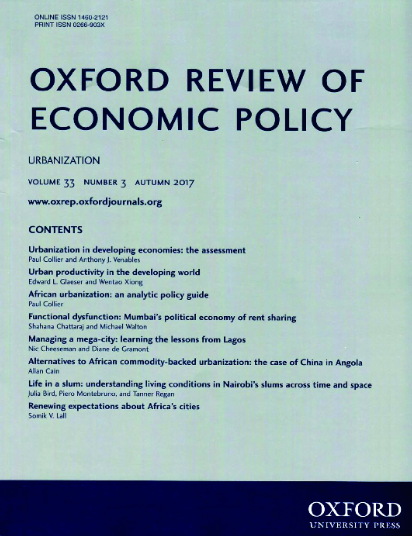Sensitive intervention points: a strategic approach to climate action
IF 1.8
2区 经济学
Q2 ECONOMICS
引用次数: 2
Abstract
While some countries are making progress reducing greenhouse gas emissions, few are progressing rapidly enough to be on track to reach net zero emissions by mid-century. The transition to net zero involves deep structural transformation of the global economy and its associated complex socio-technical systems. Here, we set out a conceptual framework to identify ‘sensitive intervention points’ (SIPs) in systems where a small or moderately-sized intervention could drive outsized impacts and transformational change. These points take three forms: (i) critical tipping points, such as a critical price threshold, (ii) critical nodes in networks, such as an influential actor in a social network, and (iii) critical points in time, where windows of opportunity for change open up. We also propose an assessment methodology for prioritizing interventions in terms of their potential impacts, risks, and ease of implementation. We apply our framework and assessment methodology to evaluate a list of proposed interventions for accelerating global decarbonization. Promising interventions include investing in key clean energy technologies with consistent cost declines, introducing central bank policies to reduce the value of polluting collateral, and enhancing climate-related financial risk disclosure.敏感的干预点:气候行动的战略方针
虽然一些国家在减少温室气体排放方面取得了进展,但很少有国家进展迅速,能够在本世纪中叶走上实现净零排放的轨道。向净零排放的过渡涉及全球经济及其相关的复杂社会技术系统的深刻结构转型。在这里,我们提出了一个概念性框架,以确定系统中的“敏感干预点”(SIPs),在这些系统中,小规模或中等规模的干预可能会产生巨大的影响和转型变化。这些点有三种形式:(i)关键引爆点,如关键价格门槛;(ii)网络中的关键节点,如社交网络中有影响力的行动者;(iii)变革机会之窗打开的关键时间点。我们还提出了一种评估方法,根据干预措施的潜在影响、风险和实施的容易程度来确定干预措施的优先次序。我们应用我们的框架和评估方法来评估一系列旨在加速全球脱碳的拟议干预措施。有希望的干预措施包括投资于成本持续下降的关键清洁能源技术,引入中央银行政策以降低污染抵押品的价值,以及加强与气候相关的金融风险披露。
本文章由计算机程序翻译,如有差异,请以英文原文为准。
求助全文
约1分钟内获得全文
求助全文
来源期刊

Oxford Review of Economic Policy
ECONOMICS-
CiteScore
12.50
自引率
1.50%
发文量
41
期刊介绍:
The Oxford Review of Economic Policy is a refereed journal which is published quarterly. Each issue concentrates on a current theme in economic policy, with a balance between macro- and microeconomics, and comprises an assessment and a number of articles. It gives a valuable appraisal of economic policies worldwide. While the analysis is challenging and at the forefront of current thinking, articles are presented in non-technical language to make them readily accessible to all readers. The Oxford Review is aimed at a wide audience including government, business and policy-makers, as well as academics and students. It is required reading for those who need to know where research is leading.
 求助内容:
求助内容: 应助结果提醒方式:
应助结果提醒方式:


